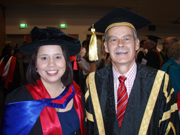 Does language and cultural background affect how we detect lies and deception, and make judgements about credibility? Studies by a Charles Sturt University (CSU) PhD graduate found that research participants were not only generally poor at classifying lies and truths from individuals of their own culture, but also in a cross-cultural context.
Does language and cultural background affect how we detect lies and deception, and make judgements about credibility? Studies by a Charles Sturt University (CSU) PhD graduate found that research participants were not only generally poor at classifying lies and truths from individuals of their own culture, but also in a cross-cultural context.Dr Paola Castillo will receive her PhD for her thesis Cultural and Cross-cultural factors in judgments of credibility from the CSU School of Psychology at the Faculty of Arts graduation ceremony in Bathurst at 5.30pm on Saturday 17 December.
“The detection of deception has been relatively unexplored from a cross-cultural standpoint,” Dr Castillo said. “My thesis aimed to extend current knowledge on cross-cultural lie detection by investigating the impact of a number of cultural and cross-cultural factors in judgments of credibility.
“Overall, my findings provide evidence that cultural differences in behavioural norms and practices have the potential to create misunderstandings and errors during cross-cultural communications, particularly when one of the communicators is speaking in their second language. Other factors such as stereotypes and prejudice also play an important role when people are trying to explain and predict a stranger’s behaviour, and may potentially produce misunderstandings during cross-cultural interactions.”
Dr Castillo conducted four studies with responses from 527 Australian and Colombian university students.
“Current deception literature suggests that accurate lie detection in a cross-cultural context may be possible,” she said. “However, cross-cultural factors may increase the potential for error or biases.
“My research adds to current understanding and has particular relevance to fields such as immigration, policing, justice and court proceedings, as well as everyday individual interactions.”





Social
Explore the world of social